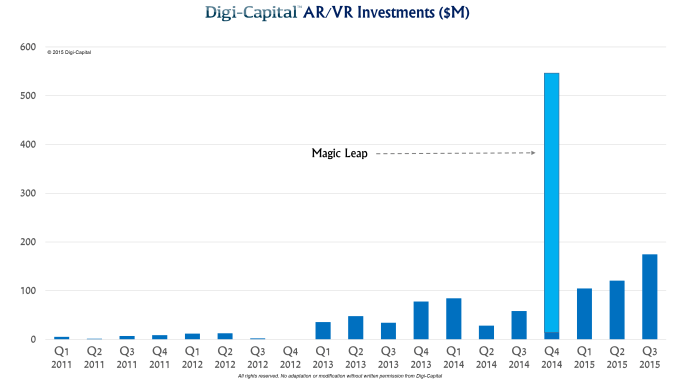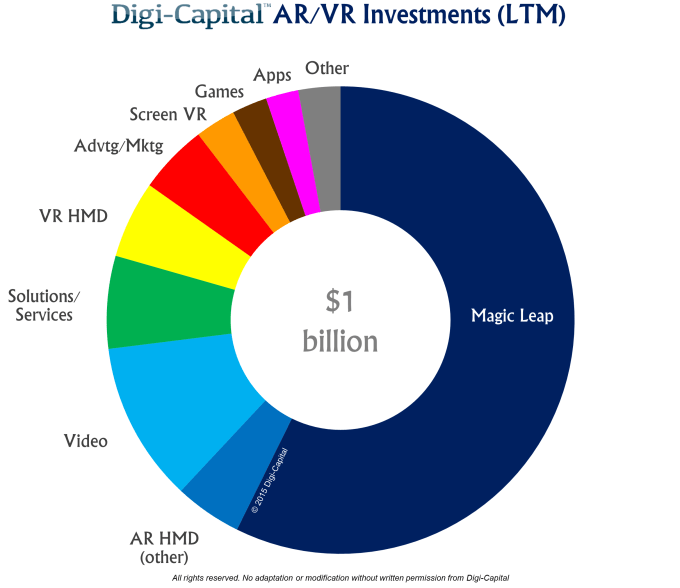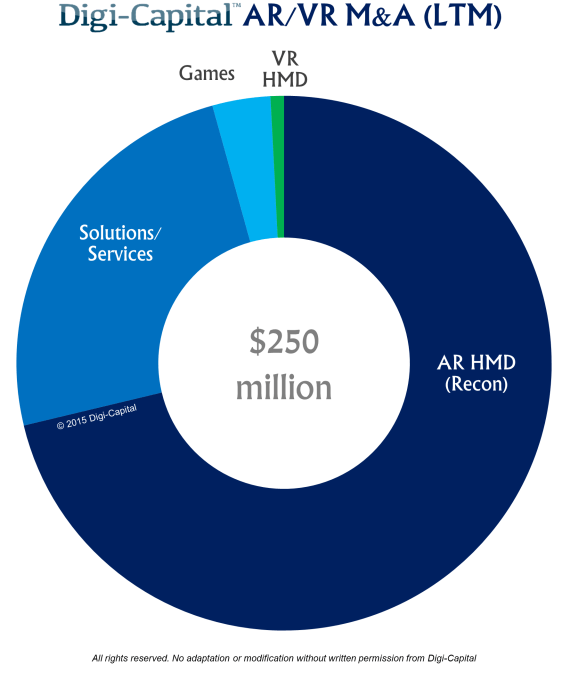Breaking Down Billion-Dollar AR/VR Investment In The Last 12 Months
Augmented and virtual reality are the new hotness, as VCs and corporates get in on the act. While Facebook’s multi-billion dollar acquisitionof Oculus got everyone’s attention early last year, it’s only in the last 12 months that investments accelerated.
Augmented/Virtual Tech, Real Investment
There was a slow trickle of AR/VR investments from 2006 until late 2014. Then Magic Leap raised $542 million from Google and others. This was the starting gun for investment accelerating, with nearly $1 billion poured into the sector in the last 12 months.
Last quarter alone saw more than 6x the investment in the market from Q2 2014. While VC and corporate communities are still developing an informed focus on the industry, their interest has never been higher.

Magic Leap took more than half the money in the last 12 months, and there are reports that they’re raising another billion. VCs and corporates have also become excited beyond our Floridian friends, with an impressive diversity of investment in a market that hasn’t really launched yet.
There have been significant investments in AR/VR head-mounted displays, video, solutions/services, advertising/marketing, games and apps. As the ecosystem begins to take shape, the investment community is providing the fuel to take AR/VR skywards.
 Not An Exit Market Yet
Not An Exit Market Yet
Facebook’s Oculus acquisition was another catalyst for investors and corporates, but there has been a bigger impact on investment than M&A so far.
The AR/VR market delivered $250 million of M&As in the last 12 months, with Intel buying Recon accounting for around three-quarters of the total. That could change dramatically next year, as major corporates try to leapfrog the competition through buying hot startups.
 Virtually Guaranteed To Be Augmented
Virtually Guaranteed To Be Augmented
With the AR/VR market beginning to launch, the investment community today is divided into true believers like Intel, Google, Facebook and Microsoft, and those taking a wait and see attitude.
There will be bumps in the road next year, but fortune favors the brave in early stage investment markets. When the market gets going and there are a few more chunky exits, it’s going to become increasingly hard for folks to stay on the sidelines.
Augmented/Virtual Tech, Real Investment
There was a slow trickle of AR/VR investments from 2006 until late 2014. Then Magic Leap raised $542 million from Google and others. This was the starting gun for investment accelerating, with nearly $1 billion poured into the sector in the last 12 months.
Last quarter alone saw more than 6x the investment in the market from Q2 2014. While VC and corporate communities are still developing an informed focus on the industry, their interest has never been higher.

Magic Leap took more than half the money in the last 12 months, and there are reports that they’re raising another billion. VCs and corporates have also become excited beyond our Floridian friends, with an impressive diversity of investment in a market that hasn’t really launched yet.
There have been significant investments in AR/VR head-mounted displays, video, solutions/services, advertising/marketing, games and apps. As the ecosystem begins to take shape, the investment community is providing the fuel to take AR/VR skywards.

Facebook’s Oculus acquisition was another catalyst for investors and corporates, but there has been a bigger impact on investment than M&A so far.
The AR/VR market delivered $250 million of M&As in the last 12 months, with Intel buying Recon accounting for around three-quarters of the total. That could change dramatically next year, as major corporates try to leapfrog the competition through buying hot startups.

With the AR/VR market beginning to launch, the investment community today is divided into true believers like Intel, Google, Facebook and Microsoft, and those taking a wait and see attitude.
There will be bumps in the road next year, but fortune favors the brave in early stage investment markets. When the market gets going and there are a few more chunky exits, it’s going to become increasingly hard for folks to stay on the sidelines.

